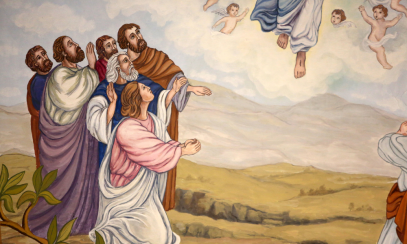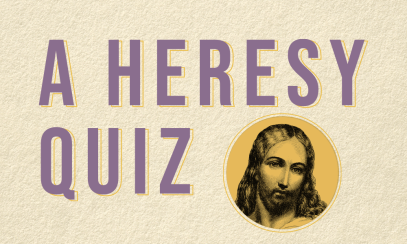What Does It Mean for God to Create?
How do we know God created the world?
Fr. Stevens: The full meaning of God as creator we only know through direct revelation and Scripture. What does it mean for God to create? How does it launch this whole process of salvation? Even Aquinas recognized that , even apart from the light of faith, there are evidences or signs of a creator God all around us. We experience purposefulness in the world. Now, to be sure, there is randomness and disorder that never satisfy the human mind. We cannot explain the world around us or even orient ourselves to it by reference to that randomness. But there is a sense of directionality, that we are moving toward something. There is a sense of some kind of plan at work – it may not be fully realized, it may only be intimated, but there is a kind of intelligibility present.
Evolution or other scientific theories don’t really get to the heart of these theological issues. Science, whether it’s evolution or physics, can only defer to the theological question. It can never fully explain it. Science in any form cannot talk about the ultimate from which everything came nor the ultimate destination of all things. These are ultimately metaphysical and theological questions, and science is ill-equipped to deal with that. There is nothing that contradicts the idea that the Creator God can use evolution to bring forward his providential and creative plan. I think what the church is saying is that a strict Darwinian evolution, one that reduces everything to chance and necessity, that’s not in keeping with providence. There are actually very few strict Darwinians out there anyway. God, in his subtlety, can use all sorts of means to bring forth his plan for creation.
Fr. Schoenstene: How do we know anything? We know things in many ways – one of them is through experience. Drop a bowling ball on your foot and it hurts. We also know things because people tell us – we used to believe the sun went around the earth – we now trust the physicists who tell us otherwise. A big way of knowing is by trusting what someone has said. We know about God through faith – the kind of knowing in which you trust that there is something you believe in, and we believe that Jesus is the son of God and can be trusted. Something about the Old Testament has the ring of truth – we come to know God through revelation rather than just our own experience. It’s basically a matter of faith. It seems to fit the facts.
The atheists who say there is absolutely no God have a false position, because they cannot know that. Agnostics who say “I don’t know” are more honest. The evidence is that there is something in front of us.
– Elizabeth Solsburg
Are you a heretic?
What do you believe about the nature of God? Do you think God is:
a. a single person who has revealed himself in three modes or forms throughout history? God the Father in the Old Testament, Jesus in the New Testament, and the Holy Spirit after the Resurrection?
b. three persons, Father, Son and Holy Spirit, who are of one essence.
According to the Catechism of the Catholic Church, the correct answer is b. If you answered a, you have fallen into the heresy of modalism, which states that God has revealed himself in three forms or modes. The modes are consecutive and not simultaneous. Current groups who are modalistic include some Pentecostal and apostolic churches.
Symbols: 3
The number 3 is a symbol of holiness in Judaism – the Holy of Holies was 1/3 of the Temple, and there were three vessels. The blessing of the priest had three sections and the word “holy” is repeated three times when calling upon God. The number is significant for Christians as a symbol of the Trinity.
Bible Quiz
Where in the world …
This mountainous land was east of the Jordan and extended from the southern end of the Sea of Galilee. It is well-watered and ideal for growing olives and vines. It was famous for being rich with balm and well-forested. In the Song of Solomon, the beloved’s hair is compared with a flock of goats from this region. Try that compliment today! Its most famous native son? Elijah, who was from the town of Tishbe. What is this biblical land named?
Gilead
Who is that philosopher?
Prior to studying theology, seminarians study philosophy, which is defined as “the love of wisdom.” Many great theologians have thoughts rooted in pre-Christian philosophers, and we are going to profile some of them in this series.
Socrates
Who was he? Socrates was a famous Greek philosopher in Athens whose writings either didn’t exist or didn’t survive. So how do we know anything about him? Most of Socrates’ history comes from three sources: Plato’s dialogues, Aristophanes’ plays and Xenophon’s dialogues. According to Plato, Socrates was the son of Sophroniscus and Phaenarete. He married Xanthippe, and they had three sons: Lamprocles, Sophroniscus and Menxenus.
What did he do? He may have been a stonemason – some sources say that he did nothing but discuss philosophy.
What is he best known for? Socrates is most well-known for the method that bears his name. Under the Socratic method, problems are framed in the form of a question and the answer to the question will yield a solution to the problem. The questions and answers are often stated in a process of elimination. He was concerned with the pursuit of truth and the immortality of the soul.
How did he die? Socrates was at odds with the political powers in Athens and he was convicted of heresy and corruption of Athenian youth. He was sentenced to death by hemlock poisoning. Submitting himself to the authority of the state, and not wishing to appear fearful of death, Socrates refused an attempt to escape and drank the poison.



